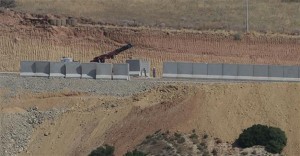Turkey has finished the construction of a 700-kilometer wall along its border with Syria to block terrorist infiltration into the country, with Defense Minister Fikri Işık saying a similar wall would be built on the border with Iran in the country’s east.
Speaking in parliament, Işık said most of the wall construction had been completed along the 828-kilometer border, Turkey’s longest.
The minister said an “integrated protection” system would be installed along Turkey’s borders as part of security precautions.
As part of the “integrated security” system, lighting, a sensor system and cameras will be installed along the border, the defense minister said, adding that security would also be enhanced by the use of drones and broader surveillance.
Noting that the security system would be put in practice at all borders in time, Işık said wall construction efforts had been started on the Iranian border by the Interior Ministry and that authorities had been considering a variety of options for the Iraqi border.
Turkey’s border with Syria is largely flat, although the mountainous terrain along the Iranian border could create more challenges in the construction of further walls for the ostensible purpose of halting the infiltration of terrorists.
“While the physical border security systems are being built, we are also switching to a multiple system. It will be a system that integrates wall, road, lightening system, fiberoptic censors, cameras, balloons and drones,” Işık said, adding that the pilot implementation of the system would soon be implemented.
“The efforts for it were concluded and the pilot practice will be carried out soon. We can’t tell you the place yet. The second stage will be implemented in accordance with a certain schedule on all of our borders after the construction of the walls end,” he also said.
Turkey launched efforts to increase border security to prevent militants from the outlawed Kurdistan Workers’ Party (PKK) and the Islamic State of Iraq and the Levant (ISIL) from infiltrating the country.
Both groups have staged deadly bomb attacks that have claimed the lives of hundreds of people.
During his speech, Işık said the system would facilitate precautions when a threat approaches the border.
“This system is not a struggle like watching if someone jumped over a wall, but it features taking precautions when a threat approaches the border. The precautions will be able to be taken from far. The first practice is starting as a pilot. We will then develop the system on the Iranian and Iraqi borders,” he added.
Işık also said the decision on the style of the precautions on the Iraqi border had yet to be taken.
“The decision on whether the practice on the Iraqi border will be with a wall or an integrated system alone hasn’t been taken yet. We are laying emphasis on different alternatives. The system we call wideband observation determines the slightest movement, detects it and raises an alarm. We are now at the stage of making a decision for the Iraqi border,” he said.
The minister said the remaining part of the wall on the Syrian border would be completed by the end of July.
“The terrorist group PKK is planting mines to delay the building of a wall and weakening security precautions. There are short-term delays for that reason, but we are at the last stage. The terrorist organization is planting home-made explosives on the spots that will be covered with a border. We have cleared over a thousand home-made explosives and between 4,000 and 5,000 mines. That’s why it was stalled off a little but, otherwise it would have been over by now,” he added.
Ask me anything
Explore related questions





